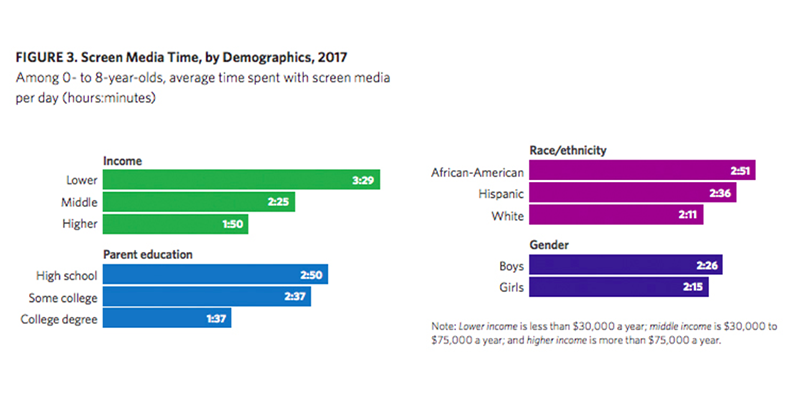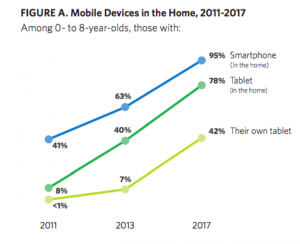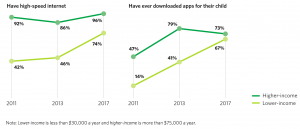Children From Low-Income, Less Educated Families Spend Nearly Twice as Much Time on Screens

Children from lower-income families spend an average of three and a half hours each day on screen media, according to a nationwide survey conducted by the nonprofit Common Sense Media. That amount is 40 percent longer than middle-income children (two hours and 25 minutes) and almost double the screen time spent by affluent children (one hour and 50 minutes).
And children whose parents are less educated spend far more time on screens (two hours and 50 minutes) than children whose parents who have graduated from college (one and 37 minutes).
The poll, which surveyed 1,400 parents of children ages 8 or younger, is the third administered by the group over the first decade of mobile technology. Taken with its first two iterations, published in 2011 and 2013, it paints a picture of increasing penetration of smartphones and tablets into American life, along with hardening anxieties about the effects of screen media consumption by young children. Strong majorities of parents from all demographic groups expressed concerns about their kids spending too much time in front of screens and the violence, sexual content, and advertising they might encounter.
Perhaps the study’s most critical finding is the sheer number of kids exposed to mobile technology in their early years. Just six years ago, 41 percent of children under the age of 8 lived in a house with a mobile device, such as a smartphone or tablet; today, that figure is 98 percent. While 8 percent of households owned a tablet in 2011, 78 percent do so now. In fact, 42 percent of young children possess their very own tablets. Less than 1 percent could say that in the poll’s first year.

Much of this change can be explained as a product of America’s rapidly closing digital divide. While there has been little growth since 2013 in the proportions of higher-income families — defined as those earning more than $75,000 annually — that own a computer (from 90 percent to 97 percent) or a mobile device (from 91 percent to 99 percent), families making less than $30,000 have surged in both categories. Although the percentage of lower-income families with access to high-speed internet still lags significantly behind their more affluent counterparts, it has increased by almost half over the past four years alone.

But although those devices have proliferated widely over the past few years, most parents are still in the dark about experts’ recommendations on how to use them. The American Academy of Pediatrics has long issued guidelines on responsible media consumption for kids, but just 1 in 5 parents say they know about them. High-income parents and those with college degrees are about 50 percent more likely to be aware of the AAP advice than lower-income and less educated parents.
That may be why almost half of all children 8 or under watch TV or play video games just before bed, in spite of the fact that the AAP expressly suggests that they refrain from doing so.
Overall, even though the average American child spends nearly two hours and 20 minutes each day interacting with screen media, just 20 percent of parents say that they’ve had a discussion with their pediatrician on media usage.
The survey is a snapshot of a moment when parents have increasingly begun to fret over screen time. Researchers have pointed to the number of hours teenagers particularly spend on their phones and laptops as a likely factor in the skyrocketing number of adolescents complaining of overwhelming stress and anxiety. Even as those worries build, many school districts have rushed to equip under-resourced students with the laptops and mobile devices that will allow them to complete homework assignments online.
“I think many parents are worried about their teens driving, and going out with their friends and drinking,” psychologist Jean Twenge said in a recent interview with NPR. “Yet parents are often not worrying about their teen who stays at home but is on their phone all the time. But they should be worried about that.”
Get stories like these delivered straight to your inbox. Sign up for The 74 Newsletter

;)
